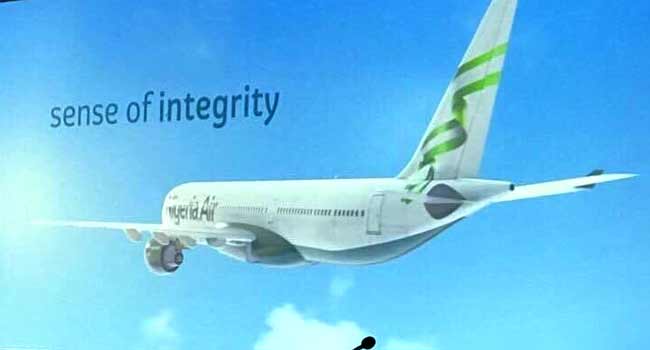The Federal Government of Nigeria has announced that the name of the proposed new National Carrier is ‘Nigeria Air’.
The Minister of State for Aviation, Sen. Hadi Sirika, disclosed this on Wednesday while unveiling the airline to investors at the ongoing Farnborough International Air Show in UK.
The colour is green white green.
Nigerian officials at the Air Show have been meeting with both Boeing and Air Bus to strike a deal on the aircraft needed for the commencement of operations by the new national carrier.
The Minister during the unveiling said the National Carrier will be private sector driven and not a “social service”.
“This will be a National Carrier that is Private sector-led and driven.
“It is a business, not a social service. The government will not be involved in running it or deciding who runs it. The investors will have full responsibility for this”.
He added that the Federal Government will not own more than 5% (maximum) of the new National Carrier.
The Minister had in January disclosed that the National Carrier will be unveiled this year, although it could not be established as earlier said in 2017.
He has now reaffirmed the FG’s commitment to ensuring that the nation has a functional airline before the year ends.
On job creation, the minister said the establishment of the airline will create economic and job opportunities.
“We want to use this new private-sector-led airline to make a statement that, ‘Yes, Nigeria can do it!’ and we also want to promote our cultures and traditions. It will also create economic opportunities and jobs”.
The minister also noted that negotiations are ongoing concerning the aircraft for the airline which will be announced soon.
“We’ve been talking to Airbus and Boeing (and they’re present at this event) regarding the aircraft for #NigeriaAir, and we will be making announcements very soon. We are currently negotiating”.
Nigeria’s first national carrier was established in 1958 and stopped operations in 2003 with more than 30 aircraft on its fleet in the 1980s.
According to him, “This is an important day for Nigeria. The largest economy in Africa, largest population, GDP of around half a billion dollars, and the only true aviation player in West and Central Africa,” Sirika said.
“Nigeria has unfortunately not been a serious player in Aviation for a long time. We used to be a dominant player, through Nigeria Airways, but sadly not anymore.
“This will be a national carrier that is private sector led and driven. It is a business, not a social service. The government will not be involved in running it or deciding who runs it. The investors will have full responsibility for this.
“The Nigerian government will not own more than 5% (maximum) of the new national carrier. The government will not be involved in running it or deciding who runs it.
“New terminals in Lagos and Abuja Airports will add 11 million passenger capacity in each of the two airports.”
The Minister had in January disclosed that the National Carrier will be unveiled this year, although it could not be established as earlier said in 2017.
He has now reaffirmed the FG’s commitment to ensuring that the nation has a functional airline before the year ends.
On job creation, the minister said the establishment of the airline will create economic and job opportunities.
“We want to use this new private-sector-led airline to make a statement that, ‘Yes, Nigeria can do it!’ and we also want to promote our cultures and traditions. It will also create economic opportunities and jobs”.
The minister also noted that negotiations are ongoing concerning the aircraft for the airline which will be announced soon.
“We’ve been talking to Airbus and Boeing (and they’re present at this event) regarding the aircraft for #NigeriaAir, and we will be making announcements very soon. We are currently negotiating”.
Nigeria’s first national carrier was established in 1958 and stopped operations in 2003 with more than 30 aircraft on its fleet in the 1980s.
According to the minister, the airline will have flights on 81 domestic, regional and international routes.
Operations are scheduled to begin in December 2018.














